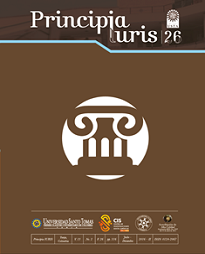JUDGE: LAWMAKER POSITIVE
Main Article Content
Abstract
Article Details
Por medio de esta comunicación certifico que el artículo que estoy presentando para posible publicación en la revista institucional impulsada de la Facultad de Derecho de la Universidad Santo Tomás seccional Tunja, Principia Iuris, es de mi entera autoría, siendo sus contenidos producto de mi directa contribución intelectual.
Todos los datos y referencias a publicaciones hechas están debidamente identificados con su respectiva nota bibliográfica y en las citas que se destacan como tal.
Por todo lo anterior, declaro que el material presentado se encuentra conforme a la legislación aplicable en materia de propiedad intelectual, y por lo tanto, me hago responsable de cualquier reclamación relacionada a esta.
En caso de que el artículo presentado sea publicado, manifiesto que cedo plenamente a la Universidad Santo Tomás seccional Tunja los derechos de reproducción del mismo y accedo a las modificaciones que de forma se requieran para adaptarse a la estética de la revista. Como contraprestación de la presente cesión, declaro mi conformidad de recibir (2) ejemplares del número de la revista en que aparezca mi artículo.
References
Atienza, M. (1997). Derecho y argumentación. Bogotá, D.C.: Universidad Externado.
________. (2012). El sentido del Derecho. Barcelona: Ariel.
Berlin, I. (s.f.). Partido Liberal Libertario. Recuperado el 27 de octubre de 2012, de http://www.liberallibertario.org/home/: http://www.liberallibertario. org/home/index.php/biblioteca-liberal-libertaria/doc_download/168-isaiahberlin-dos-conceptos-de-libertad
Cárdenas Sierra, C. A., & Guarín Ramírez, E. A. (2006). Filosofía y Teoría del Derecho: Tomás de Aquino en Dálogo con Kelsen, Hart, Dworkin y Kaufmann. Bogotá, D.C.: Universidad Santo Tomás.
Carrillo, Y. (2008). Temas y problemas de la filosofía del derecho. Bogotá, D.C.: Ediciones Doctrina y Ley.
Carrio, G. (1986). Notas sobre derecho y lenguaje. Buenos Aires: AbeledoPerrot.
Cortés, F. (2009). El fundamento igualitarista de los derechos sociales. En: M. Cepeda, & R. Arango, Amistad y alteridad: Homenaje a Carlos B. Guitiérrez (pp. 341-351). Bogotá: Uniandes.
Díaz, E. (1998). Curso de filosofía del derecho. Madrid: Marcial Pons.
García Villegas, M., & Saffon, M. P. (2011). Derechos sociales y activismo judicial: La dimensión fáctica del activismo judicial en derechos sociales en Colombia. Estudios Socio-Jurídicos, 13(1), 75-107.
Gargarella, R. (2006). ¿Democracia deliberativa y judicialización de los derechos sociales? Perfiles Latinoamericanos, 9-32.
Hart, H. (1994). El cielo de los conceptos de Ihering y la jurisprudencia analítica moderna. En: El ámbito de lo jurídico: lecturas de pensamiento jurídico contemporáneo (pp. 109-126). Barcelona: Crítica.
Kaufmann, A. (1999). Filosofía del Derecho. Bogotá, D.C.: Universidad Externado.
Kelsen, H. (2010). Teoría Pura del Derecho. Bogotá, D.C.: Libro Hidalgo.
Kennedy, D. (1999). Libertad y restricción en la decisión judicial. Estudio preliminar: César Rodríguez. Bogotá. D.C.: Siglo del Hombre editores. Ediciones Uniandes.
Kennedy, D. (2010). Izquierda y Derecho. Buenos Aires: Siglo XXI Editores S. A.
López Daza, G. A. (2011). El juez constitucional colombiano como legislador positivo: ¿un gobierno de los jueces? Cuestiones Constitucionales (24), 169193.
Quinche Ramírez, M. F. (2010). Derecho Constitucional Colombiano: de la Carta de 1991 y sus reformas. Bogotá, D.C.: Ediciones Doctrina y Ley.
Rabossi, E. (1994). Los Derechos Humanos económicos: Crítica a ciertos argumentos liberales. En: C. B. (Edi), El trabajo filosófico de hoy en el continente (p. 1195). Bogotá: ABC.
T-197. (Corte Constitucional Colombiana. M. P.: Alberto Rojas Ríos, 1 de abril de 2014).
T-406. (Corte Constitucional Colombiana. M. P.: Ciro Angarita Barón, 5 de junio de 1992).
Uprimny Yepes, R., & Rodríguez Villabona, A. A. (2008). Interpretación Judicial. Bogotá, D.C.: Consejo Superior de la Judicatura.

